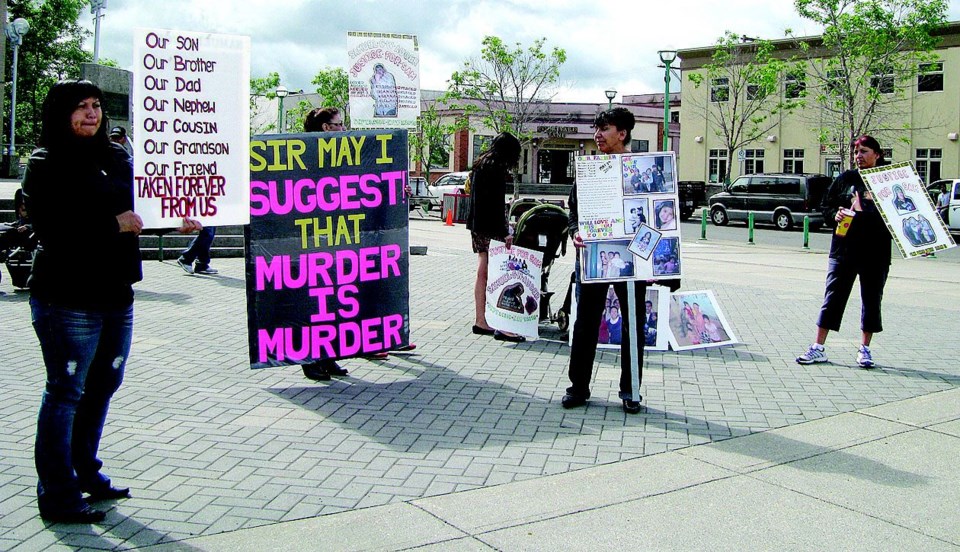Gordon Mayward Kerr was sentenced to four years in prison Monday for criminal negligence causing death for a 2010 incident that killed Samuel Charles Auger.
B.C. Supreme Court Justice Arne Silverman handed down the sentence late in the afternoon after hearing oral arguments on Monday morning. Crown counsel Marie Louise Ahrens had called for a six-year jail term, while defence lawyer George Leven was seeking two years of imprisonment plus three years of probation for his client.
Kerr was convicted of criminal negligence by a jury in June, but was acquitted of the more serious charge of manslaughter.
During the early morning of April 28, 2010, Kerr was making a routine trip to the Mohawk convenience store at Eighth and Central when a woman who was an associate of Auger asked Kerr for assistance to leave the area. Kerr complied, taking the woman to a safe place, but as he was leaving Auger threw what Silverman described as "rocks or something akin to rocks" at Kerr's truck.
After dropping the woman off, Kerr returned to the convenience store and saw Auger again. After another confrontation, Kerr began chasing Auger in his pickup truck. Kerr eventually struck Auger with the vehicle in a nearby parking lot, severely injuring him.
Kerr left the scene after hitting Auger, but went to the police station to report the incident.
Auger, 29, died nine days later due to blunt force trauma to the head resulting from the incident with Kerr.
Silverman determined that Kerr didn't chase Auger with the intention of hitting him, but in the course of the short 150-metre pursuit Kerr exercised recklessness and wanton disregard for Auger's safety.
"Although you didn't intend to hit him or assault him, you did intend to chase him while you were driving your truck," Silverman said, adding Kerr alone was responsible for Auger's death.
In determining the sentence, the judge took into account that Kerr had no previous criminal record, that he was remorseful, that he had no racial bias towards Auger and his First Nations heritage and that the origin of the incident was Kerr trying to help a woman.
"Regrettably he didn't have the wisdom or the self control to stay away," Silverman said.
However the judge also found that Kerr had ample opportunity to withdraw from the confrontation, that Auger was running away from him, that Kerr left Auger injured and lying on the road and that Kerr has a lengthy driving record, including 11 speeding tickets and one careless driving conviction dating back to 1986.
Kerr, dressed in a grey sweater and blue jeans, showed little emotion after the verdict but his family members were visibly upset and crying as he was led away by a sheriff.
On the other side of the courtroom, Auger's family was angry the sentence wasn't longer.
"Justice was not served today," Samuel Auger's brother Josh said outside the courtroom. "It seems like another chapter in the ongoing battle of native against white."
The Auger family has also filed a civil lawsuit against Kerr.
No one from Kerr's family wanted to speak publicly after the verdict was announced, but one man who was sitting with the Kerr group said "two families lost today."
In addition to the four years of prison, Kerr will also be banned from driving for four years after his release. He will also be barred from owning any weapons for 10 years.
Ahrens had been seeking a 15-year driving ban, while Leven argued it should be significantly less as Kerr would likely need to drive for any job he could get after getting out of prison.
In arguing for a lesser sentence, Leven contended that the civil lawsuit had the "potential to ruin (Kerr) and his family financially."
Leven also said Kerr would likely have difficulty finding work after his prison term and that his marriage recently broke up.
Ahrens wanted a longer sentence because of the impact the crime had on the community, particularly among the First Nations population.



